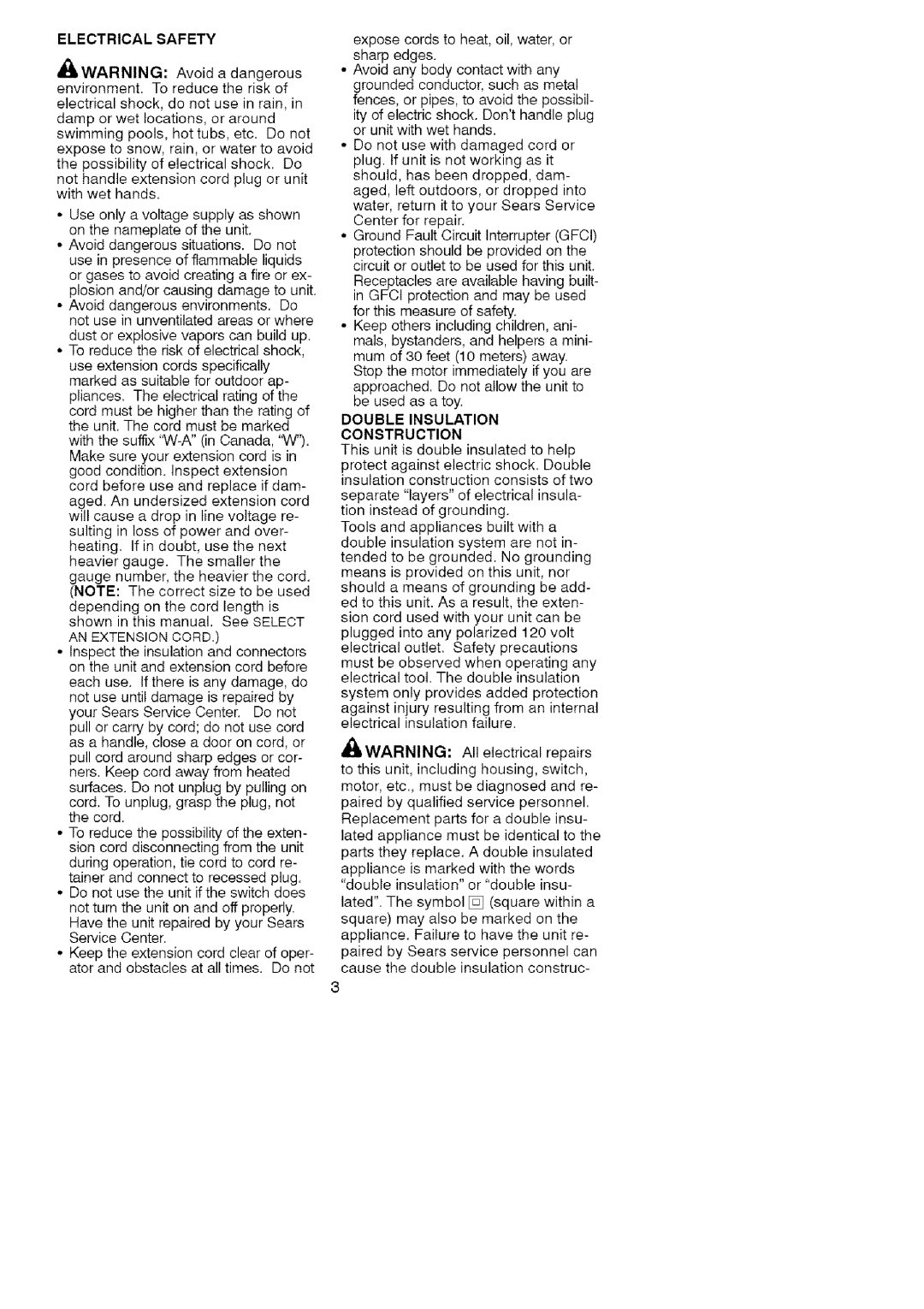
ELECTRICAL SAFETY
x't
_WARNING: Avoid a dangerous environment. To reduce the risk of
electrical shock, do not use in rain, in damp or wet locations, or around swimming pools, hot tubs, etc. Do not expose to snow, rain, or water to avoid the possibility of electrical shock. Do
not handle extension cord plug or unit with wet hands.
•Use only a voltage supply as shown on the nameplate of the unit.
•Avoid dangerous situations. Do not use in presence of flammable liquids or gases to avoid creating a fire or ex- plosion and/or causing damage to unit.
•Avoid dangerous environments. Do not use in unventilated areas or where
dust or explosive vapors can build up.
•To reduce the risk of electrical shock, use extension cords specifically marked as suitable for outdoor ap- pliances. The electrical rating of the
cord must be higher than the rating of the unit. The cord must be marked
with the suffix
cord before use and replace if dam- aged. An undersized extension cord will cause a drop in line voltage re- suiting in loss of power and over- heating. If in doubt, use the next heavier gauge. The smaller the gauge number, the heavier the cord. (NOTE: The correct size to be used
depending on the cord length is shown in this manual. See SELECT
AN EXTENSION CORD.)
•Inspect the insulation and connectors on the unit and extension cord before
each use. If there is any damage, do not use until damage is repaired by your Sears Service Center. Do not pull or carry by cord; do not use cord as a handle, close a door on cord, or pull cord around sharp edges or cor- ners. Keep cord away from heated surfaces. Do not unplug by pulling on
cord. To unplug, grasp the plug, not the cord.
•To reduce the possibility of the exten- sion cord disconnecting from the unit during operation, tie cord to cord re- tainer and connect to recessed plug.
•Do not use the unit if the switch does
not turn the unit on and off properly.
Have the unit repaired by your Sears Service Center.
•Keep the extension cord clear of oper- ator and obstacles at all times. Do not
expose cords to heat, oil, water, or sharp edges.
•Avoid any body contact with any grounded conductor, such as metal fences, or pipes, to avoid the possibil-
ity of electric shock. Don't handle plug or unit with wet hands.
•Do not use with damaged cord or plug. If unit is not working as it should, has been dropped, dam- aged, left outdoors, or dropped into water, return it to your Sears Service Center for repair.
•Ground Fault Circuit Interrupter (GFCI)
protection should be provided on the circuit or outlet to be used for this unit.
Receptacles are available having built- in GFCI protection and may be used for this measure of safety.
•Keep others including children, ani- mals, bystanders, and helpers a mini- mum of 30 feet (10 meters) away. Stop the motor immediately if you are approached. Do not allow the unit to
be used as a toy.
DOUBLE INSULATION
CONSTRUCTION
This unit is double insulated to help
protect against electric shock. Double insulation construction consists of two
separate "layers" of electrical insula- tion instead of grounding.
Tools and appliances built with a double insulation system are not in- tended to be grounded. No grounding means is provided on this unit, nor
should a means of grounding be add- ed to this unit. As a result, the exten-
sion cord used with your unit can be plugged into any polarized 120 volt electrical outlet. Safety precautions
must be observed when operating any electrical tool. The double insulation
system only provides added protection
against injury resulting from an internal electrical insulation failure.
Ai_,WARNING: All electrical repairs to this unit, including housing, switch, motor, etc., must be diagnosed and re- paired by qualified service personnel. Replacement parts for a double insu- lated appliance must be identical to the parts they replace. A double insulated appliance is marked with the words "double insulation" or "double insu-
lated". The symbol [] (square within a square) may also be marked on the appliance. Failure to have the unit re- paired by Sears service personnel can cause the double insulation construc-
3
